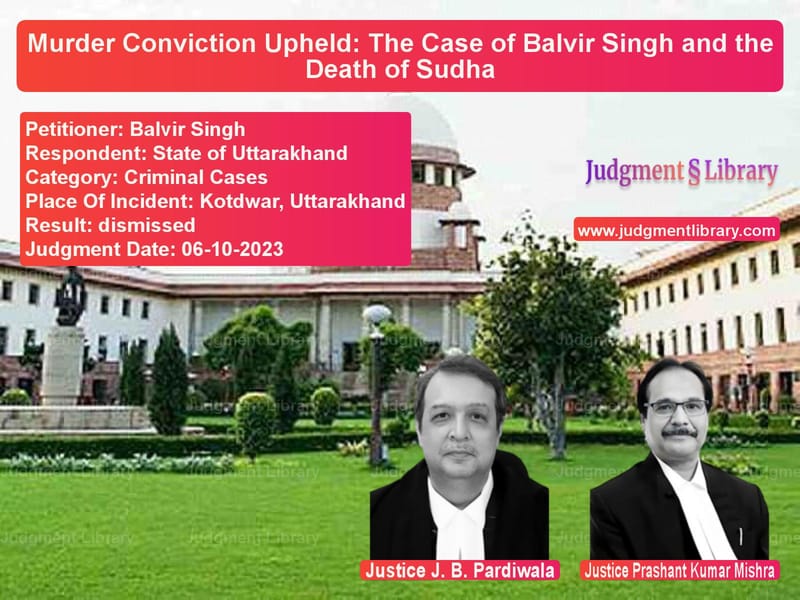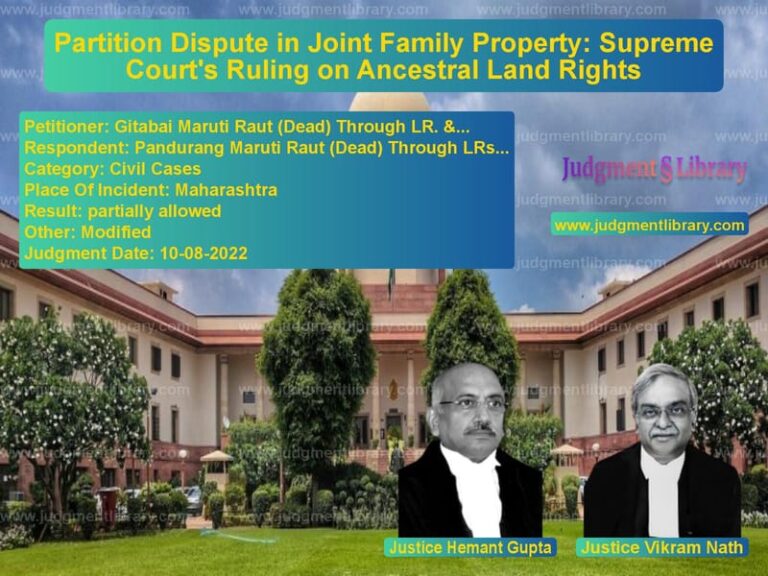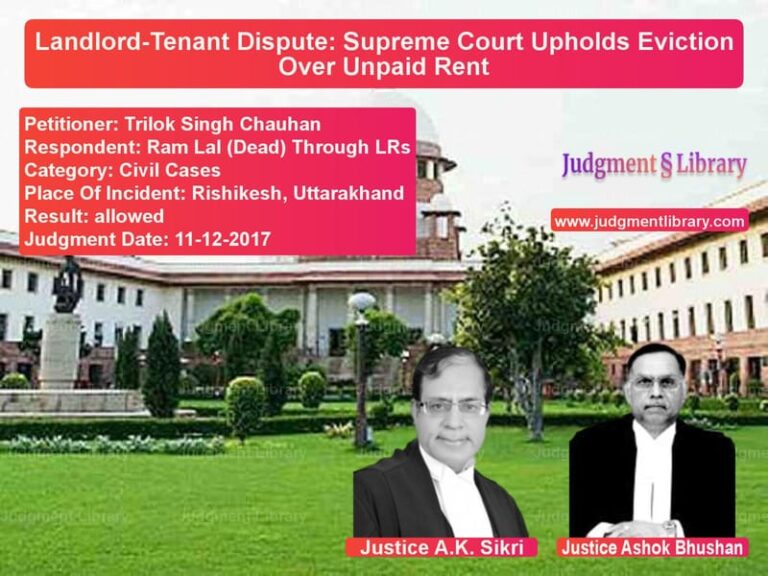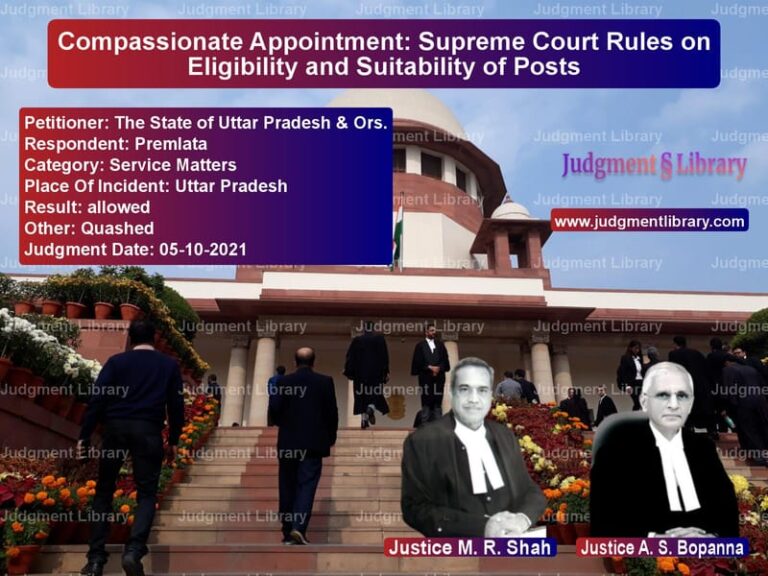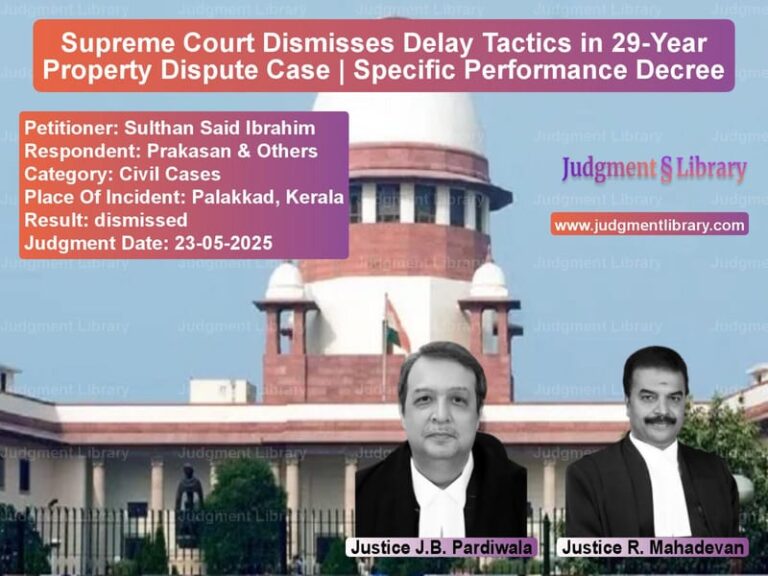Murder Conviction Upheld: The Case of Balvir Singh and the Death of Sudha
In a case that shook the legal corridors, Balvir Singh, a resident of Uttarakhand, was convicted for the murder of his wife, Sudha. The case revolved around Sudha’s death due to poisoning, which was alleged to have been administered by her husband. The trial court and the High Court both found him guilty, and his conviction was upheld by the Supreme Court.
Sudha was married to Balvir Singh on December 12, 1997. Their marriage bore a son. However, her married life was allegedly marred by persistent harassment from her husband and mother-in-law, Maheshwari Devi. The harassment escalated into dowry demands amounting to Rs. 1 lakh. Sudha had written letters to her father detailing the abuse and threats to her life.
Prosecution’s Case
On May 9, 2007, Balvir Singh took Sudha to Delhi under the pretext of medical treatment. Just a few days later, on May 13, 2007, Sudha was found dead. According to the prosecution, Balvir did not inform Sudha’s family of her death. Instead, the news reached them through a neighbor. Balvir immediately transported her body back to their village in Kotdwar, Uttarakhand.
Virendra Singh, the father of the deceased, filed an application under Section 156(3) CrPC, leading to an FIR being registered against Balvir Singh and his mother. The post-mortem report revealed poisoning as the cause of death, specifically aluminum phosphide, a highly toxic substance. The prosecution argued that Balvir Singh, having medical knowledge, used this poison to murder his wife.
Defense Arguments
The defense contended that Sudha died due to a heart condition. They argued that there was no direct evidence linking Balvir Singh to the administration of poison. They also suggested the possibility of suicide, claiming Sudha might have consumed poison due to depression from her illness.
However, the courts rejected this defense, noting inconsistencies in the explanations provided by the accused. The prosecution’s evidence, including Sudha’s letters and the post-mortem findings, strongly indicated foul play.
Court’s Rationale
The trial court found Balvir Singh guilty under Section 302 IPC (murder) and Section 498A IPC (cruelty). He was sentenced to life imprisonment and fined Rs. 10,000. His mother, Maheshwari Devi, was convicted under Section 498A IPC and sentenced to 2.5 years of imprisonment.
The High Court affirmed the trial court’s findings, emphasizing that Balvir Singh failed to provide a reasonable explanation for his wife’s death, which occurred in his presence. The Court also pointed out that the presence of poison in Sudha’s body negated the theory of natural death.
In the Supreme Court, Balvir Singh’s counsel argued that the case lacked direct evidence and relied on circumstantial inferences. However, the Court ruled that Section 106 of the Evidence Act placed the burden on the accused to explain the circumstances surrounding the death, especially when it happened in his presence.
Supreme Court Verdict
The Supreme Court upheld the conviction, stating:
“The cause of death is due to poisoning. The poison detected in the viscera was aluminum phosphide. It is too much for the convicts to say that the presence of aluminum phosphide in the viscera could be due to the medicines which the deceased used to take for her heart ailment. Such medicines, even in high dosage, would not lead to the formation of aluminum phosphide in the body.”
On the issue of Balvir Singh’s failure to explain the events, the Court observed:
“In a case where the various links have been satisfactorily made out and the circumstances point to the accused as the probable assailant, with reasonable definiteness and in proximity to the deceased as regards time and situation, and he offers no explanation, such absence of explanation or false explanation would itself be an additional link which completes the chain.”
However, considering that Maheshwari Devi was convicted only under Section 498A IPC, the Court reduced her sentence to the period already undergone and discharged her from custody.
Conclusion
This case reaffirms the importance of circumstantial evidence in criminal trials. The courts placed heavy reliance on the victim’s letters, medical evidence, and the accused’s conduct post-death. The verdict serves as a reminder that in cases of custodial deaths within domestic settings, the onus shifts to the accused to explain the circumstances, especially when they have exclusive knowledge of the events leading to the death.
Petitioner Name: Balvir Singh.Respondent Name: State of Uttarakhand.Judgment By: Justice J. B. Pardiwala, Justice Prashant Kumar Mishra.Place Of Incident: Kotdwar, Uttarakhand.Judgment Date: 06-10-2023.
Don’t miss out on the full details! Download the complete judgment in PDF format below and gain valuable insights instantly!
Download Judgment: balvir-singh-vs-state-of-uttarakhand-supreme-court-of-india-judgment-dated-06-10-2023.pdf
Directly Download Judgment: Directly download this Judgment
See all petitions in Murder Cases
See all petitions in Dowry Cases
See all petitions in Domestic Violence
See all petitions in Fraud and Forgery
See all petitions in Legal Malpractice
See all petitions in Judgment by J.B. Pardiwala
See all petitions in Judgment by Prashant Kumar Mishra
See all petitions in dismissed
See all petitions in supreme court of India judgments October 2023
See all petitions in 2023 judgments
See all posts in Criminal Cases Category
See all allowed petitions in Criminal Cases Category
See all Dismissed petitions in Criminal Cases Category
See all partially allowed petitions in Criminal Cases Category

